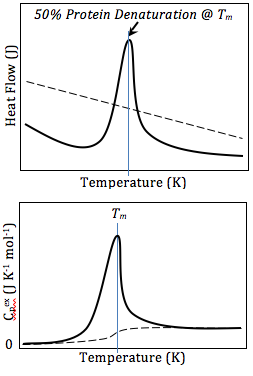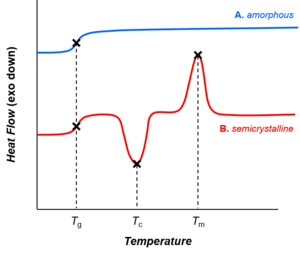Differential scanning calorimetry
Differential Scanning Calorimetry (DSC) is a thermoanalytical technique in which the difference in the amount of heat required to increase the temperature of a sample and reference is measured as a function of temperature. Both the sample and reference are maintained at nearly the same temperature throughout the experiment. Generally, the temperature program for a DSC analysis is designed such that the sample holder temperature increases linearly as a function of time. The reference sample should have a well-defined heat capacity over the range of temperatures to be scanned.
Principle
The basic principle underlying DSC is the measurement of the heat flow to the sample and reference under controlled conditions of temperature. The difference in heat flow to the sample and reference, at any given temperature, represents the heat capacity and phase transitions occurring in the sample. This difference is recorded as a function of temperature or time and results in a DSC curve, which can provide qualitative and quantitative information about physical and chemical changes that involve endothermic or exothermic processes or changes in heat capacity.
Applications
DSC is widely used in chemical, pharmaceutical, and materials science fields for various applications, including:
- Determining the melting point, glass transition temperature, and crystallization temperature of polymers.
- Studying the thermal stability and composition of materials.
- Investigating the purity of compounds.
- Analyzing the effects of additives on the stability of materials.
- Examining phase transitions and reaction kinetics.
Types of DSC
There are mainly two types of DSC:
- Heat-flux DSC: In this type, both the sample and reference are placed on the same heat sink. The difference in heat flow to the sample and reference is measured.
- Power-compensated DSC: This type uses separate heaters for the sample and reference. The power applied to each heater is adjusted to maintain both at the same temperature. The difference in power is directly proportional to the heat flow difference.
Procedure
A typical DSC experiment involves placing a small amount of sample in a pan, which is then sealed and placed in the DSC instrument. The instrument is programmed to heat the sample at a controlled rate, often in an inert atmosphere to prevent oxidation or other reactions with air. As the sample is heated, it may undergo phase transitions, such as melting or crystallization, which result in a change in heat flow. These changes are detected by the DSC and recorded as a curve of heat flow versus temperature.
Data Analysis
The analysis of DSC data involves the interpretation of the DSC curves. Endothermic peaks, indicative of heat absorption, can represent melting or decomposition, while exothermic peaks, indicative of heat release, can represent crystallization or oxidation reactions. The area under these peaks is proportional to the enthalpy change associated with the transition.
Advantages and Limitations
DSC offers several advantages, including:
- Quick and easy determination of transition temperatures and enthalpies.
- Small sample size requirement.
- Applicability to a wide range of materials.
However, DSC also has limitations, such as:
- Difficulty in interpreting overlapping transitions.
- Sensitivity to atmospheric conditions.
- Requirement for reference materials with well-defined heat capacities.
Conclusion
Differential Scanning Calorimetry is a powerful analytical tool in the field of thermal analysis, providing valuable information about the physical and chemical properties of materials. Its ability to analyze a wide range of materials makes it indispensable in research and development in various scientific and industrial fields.
Transform your life with W8MD's budget GLP-1 injections from $125.
W8MD offers a medical weight loss program to lose weight in Philadelphia. Our physician-supervised medical weight loss provides:
- Most insurances accepted or discounted self-pay rates. We will obtain insurance prior authorizations if needed.
- Generic GLP1 weight loss injections from $125 for the starting dose.
- Also offer prescription weight loss medications including Phentermine, Qsymia, Diethylpropion, Contrave etc.
NYC weight loss doctor appointments
Start your NYC weight loss journey today at our NYC medical weight loss and Philadelphia medical weight loss clinics.
- Call 718-946-5500 to lose weight in NYC or for medical weight loss in Philadelphia 215-676-2334.
- Tags:NYC medical weight loss, Philadelphia lose weight Zepbound NYC, Budget GLP1 weight loss injections, Wegovy Philadelphia, Wegovy NYC, Philadelphia medical weight loss, Brookly weight loss and Wegovy NYC
|
WikiMD's Wellness Encyclopedia |
| Let Food Be Thy Medicine Medicine Thy Food - Hippocrates |
Medical Disclaimer: WikiMD is not a substitute for professional medical advice. The information on WikiMD is provided as an information resource only, may be incorrect, outdated or misleading, and is not to be used or relied on for any diagnostic or treatment purposes. Please consult your health care provider before making any healthcare decisions or for guidance about a specific medical condition. WikiMD expressly disclaims responsibility, and shall have no liability, for any damages, loss, injury, or liability whatsoever suffered as a result of your reliance on the information contained in this site. By visiting this site you agree to the foregoing terms and conditions, which may from time to time be changed or supplemented by WikiMD. If you do not agree to the foregoing terms and conditions, you should not enter or use this site. See full disclaimer.
Credits:Most images are courtesy of Wikimedia commons, and templates, categories Wikipedia, licensed under CC BY SA or similar.
Translate this page: - East Asian
中文,
日本,
한국어,
South Asian
हिन्दी,
தமிழ்,
తెలుగు,
Urdu,
ಕನ್ನಡ,
Southeast Asian
Indonesian,
Vietnamese,
Thai,
မြန်မာဘာသာ,
বাংলা
European
español,
Deutsch,
français,
Greek,
português do Brasil,
polski,
română,
русский,
Nederlands,
norsk,
svenska,
suomi,
Italian
Middle Eastern & African
عربى,
Turkish,
Persian,
Hebrew,
Afrikaans,
isiZulu,
Kiswahili,
Other
Bulgarian,
Hungarian,
Czech,
Swedish,
മലയാളം,
मराठी,
ਪੰਜਾਬੀ,
ગુજરાતી,
Portuguese,
Ukrainian
Contributors: Prab R. Tumpati, MD



